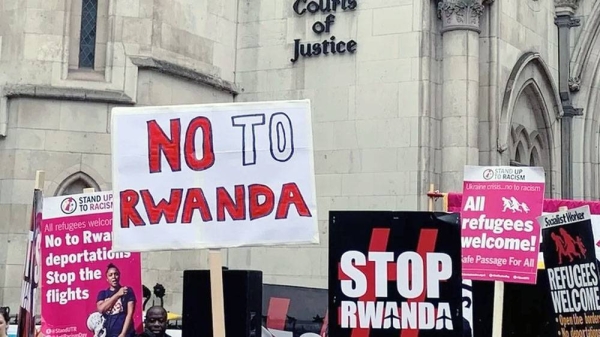
Senior judges have been urged to block government plans to send asylum seekers to Rwanda.
In a four-day hearing at the court of appeal, which concluded on Thursday, the lord chief justice, Lord Burnett, master of the rolls, Sir Geoffrey Vos, and Lord Justice Underhill, deputy president of the civil division of the appeal court, heard an appeal against a high court ruling last December that it was lawful to send some asylum seekers, including small boat arrivals, to Rwanda to have their claims processed rather than dealing with their applications for sanctuary in the UK.
The new illegal migration bill, now passing through parliament, states that all asylum seekers arriving via “irregular means” could face being forcibly removed to Rwanda.
Those supporting the appeal against the ruling include the UN’s refugee agency, lawyers, charities and a group of asylum seekers. The court heard from UNHCR that Rwanda has a record of human rights abuses towards refugees within its borders, including refoulement – forced removal to countries where they are at risk – expulsions and arbitrary detention. The refugee agency warned that the Home Office will not be able to guarantee the safety of asylum seekers who are deported to the east African country.
However, Sir James Eadie, counsel for Suella Braverman, said the home secretary was confident that the government of Rwanda would abide by undertakings given in a memorandum of understanding signed by the two countries.
“It’s a scheme which falls to be judged on its own terms,” he said. “Whatever is controversial about Rwanda in the past, this is a new context with some of these specific concerns in mind.”
Raza Husain KC, representing six individual asylum seekers, told the court there were “serious evidential gaps and deficiencies” that the judges at the high court had not properly examined.
He described Rwanda as “a highly autocratic repressive state” that “imprisons, tortures and murders those it considers to be its opponents”.
The hearing, attended by more than 30 barristers, was also told the high court judges who found the Rwanda policy to be lawful did not properly consider a similar arrangement between Israel and Rwanda, which operated between 2013 and 2018.
The court heard that refugees sent from Tel Aviv were detained without the opportunity of claiming asylum, often justified on the grounds of “security concerns” – and then arrested for not having the proper documentation. Some asylum seekers subsequently disappeared, others were smuggled to Uganda, and a number died while fleeing Rwanda and attempting to reach Libya.
The Rwanda plan will expose refugees to “serious harm” and the policy is incompatible with the UK’s international obligations, UNHCR said.
“Removal to Rwanda pursuant to the UK-Rwanda arrangement will expose asylum-seekers to a real risk of breaches of the refugee convention,” Angus McCullough, a lawyer for the office of the high commissioner for refugees, said in written arguments submitted to the court.
The charity Asylum Aid, which appealed against the high court ruling alongside the group of asylum seekers, argued that those threatened with being sent to Rwanda have a right to a fair and reasonable decision-making process and that this will not be possible with the seven days allocated under the proposed system to make representations. The charity Freedom From Torture was given permission to intervene in the case.
At the conclusion of the hearing, the judges did not give a date by which they will make their ruling, saying only “it will take as long as it takes”.












